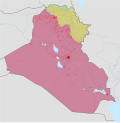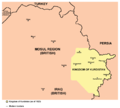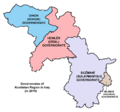William Dalrymple (historian)
The Kurdistan Portal Kurdistan (Kurdish: کوردستان, romanized: Kurdistan, lit. 'land of the Kurds'; [ˌkʊɾdɪˈstɑːn] ⓘ), or Greater Kurdistan, is a roughly defined geo-cultural region in West Asia wherein the Kurds form a prominent majority population and the Kurdish culture, languages, and national identity have historically been based. Geographically, Kurdistan roughly encompasses the northwestern Zagros and the eastern Taurus mountain ranges. Kurdistan generally comprises the following four regions: southeastern Turkey (Northern Kurdistan), northern Iraq (Southern Kurdistan), northwestern Iran (Eastern Kurdistan), and northern Syria (Western Kurdistan). Some definitions also include parts of southern Transcaucasia. Certain Kurdish nationalist organizations seek to create an independent nation state consisting of some or all of these areas with a Kurdish majority, while others campaign for greater autonomy within the existing national boundaries. The delineation of the region remains disputed and varied, with some maps greatly exaggerating its boundaries. Historically, the word "Kurdistan" is first attested in 11th century Seljuk chronicles. Many disparate Kurdish dynasties, emirates, principalities, and chiefdoms were established from the 8th to 19th centuries. Administratively, the 20th century saw the establishment of the short-lived areas of the Kurdish state (1918–1919), Kingdom of Kurdistan (1921–1924), Kurdistansky Uyezd i.e. "Red Kurdistan" (1923–1929), Republic of Ararat (1927–1930), and Republic of Mahabad (1946). In Iraq, following the Aylūl Revolt, the government entered into an agreement with the rebellious Kurds, granting Kurds local self-rule. Soon after, however, the agreement collapsed. Later, during the Iraqi no-fly zones conflict, which followed the Gulf War, the Iraqi military withdrew from parts of northern Iraq, allowing the Kurds to fill the vacuum and regain lost control in those areas. After the invasion of Iraq, and since the creation of the new Iraqi federal state, the new constitution issued in 2005 recognises Kurdistan Region as a federal region; even though the constitution does not include the term “autonomy”, it emphasises decentralisation and devolution, allowing regions and governorates to administer local affairs. In practice, however, only Kurdistan Region has exercised this authority granted by the constitution. In September 2017, Iraqi Kurds held a one-sided independence referendum, which eventually failed and was abandoned. The subsequent effort by the Iraqi government to punish Kurdistan Region has resulted in the latter losing authorities it had previously possessed, and the future of Kurdish autonomy in Iraq has been called into question. Iraqi Kurdish officials have also complained of efforts by the Iraqi government to return to the pre-2003 centralized government and dismantle Kurdistan Region altogether. There is also a Kurdistan Province in Iran, which is not self-ruled. Kurds fighting in the Syrian civil war were able to take control of large sections of northern Syria and establish self-governing regions in an Autonomous Administration of North and East Syria (commonly called Rojava), where they seek autonomy in a federal Syria after the war. (Full article...) Selected article -Salah ad-Din Yusuf ibn Ayyub (c. 1137 – 4 March 1193), commonly known as Saladin, was the founder of the Ayyubid dynasty. Hailing from a Kurdish family, he was the first sultan of both Egypt and Syria. An important figure of the Third Crusade, he spearheaded the Muslim military effort against the Crusader states in the Levant. At the height of his power, the Ayyubid realm spanned Egypt, Syria, Upper Mesopotamia, the Hejaz, Yemen, and Nubia. Alongside his uncle Shirkuh, a Kurdish mercenary commander in service of the Zengid dynasty, Saladin was sent to Fatimid Egypt in 1164, on the orders of the Zengid ruler Nur ad-Din. With their original purpose being to help restore Shawar as the vizier to the teenage Fatimid caliph al-Adid, a power struggle ensued between Shirkuh and Shawar after the latter was reinstated. Saladin, meanwhile, climbed the ranks of the Fatimid government by virtue of his military successes against Crusader assaults and his personal closeness to al-Adid. After Shawar was assassinated and Shirkuh died in 1169, al-Adid appointed Saladin as vizier. During his tenure, Saladin, a Sunni Muslim, began to undermine the Fatimid establishment; following al-Adid's death in 1171, he abolished the Cairo-based Isma'ili Shia Muslim Fatimid Caliphate and realigned Egypt with the Baghdad-based Sunni Abbasid Caliphate. (Full article...) General images -The following are images from various Kurdistan-related articles on Wikipedia.
Related portals'Religions in Kurdistan Arab states Other countries Selected picture Erbil citadel, a World Heritage Site
Did you know
CategoriesTopicsNew articlesThis list was generated from these rules. Questions and feedback are always welcome! The search is being run daily with the most recent ~14 days of results. Note: Some articles may not be relevant to this project.
Rules | Match log | Results page (for watching) | Last updated: 2025-04-25 21:12 (UTC) Note: The list display can now be customized by each user. See List display personalization for details.
Things you can do
Associated WikimediaThe following Wikimedia Foundation sister projects provide more on this subject:
Sources
Discover Wikipedia using portals |

 Read
Read
 AUTHORPÆDIA is hosted by Authorpædia Foundation, Inc. a U.S. non-profit organization.
AUTHORPÆDIA is hosted by Authorpædia Foundation, Inc. a U.S. non-profit organization.










































